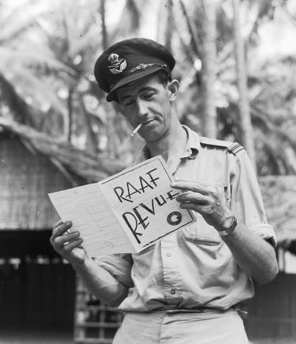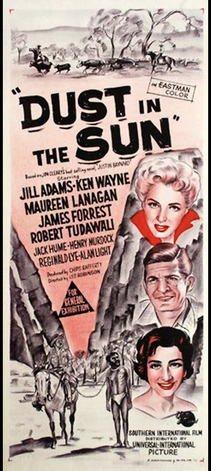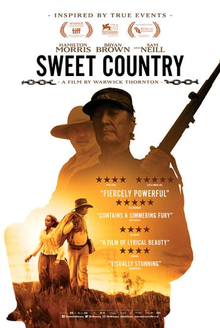Related Research Articles

Jedda, released in the UK as Jedda the Uncivilised, is a 1955 Australian film written, produced and directed by Charles Chauvel. His last film, it is notable for being the first to star two Aboriginal actors, Robert Tudawali and Ngarla Kunoth in the leading roles. It was also the first Australian feature film to be shot in colour.

Stuart Highway is a major Australian highway. It runs from Darwin, in the Northern Territory, via Tennant Creek and Alice Springs, to Port Augusta in South Australia; it has a distance of 2,720 km (1,690 mi). Its northern and southern extremities are segments of Australia's Highway 1. The principal north–south route through the central interior of mainland Australia, the highway is often referred to simply as "The Track".

John William Pilbean Goffage MBE, known professionally as Chips Rafferty, was an Australian actor. Called "the living symbol of the typical Australian", Rafferty's career stretched from the late 1930s until he died in 1971, and during this time he performed regularly in major Australian feature films as well as appearing in British and American productions, including The Overlanders and The Sundowners. He appeared in commercials in Britain during the late 1950s, encouraging British emigration to Australia.

Nobody Runs Forever, also called The High Commissioner, is a 1968 British political neo noir spy thriller action film directed by Ralph Thomas and based on Jon Cleary's 1966 novel The High Commissioner. It stars Rod Taylor as Australian policeman Scobie Malone and Christopher Plummer as the Australian High Commissioner in Britain caught up in corrupt dealings, during delicate negotiations. Taylor's production company was involved in making the film, as was the American company Selmur Productions.
The Phantom Stockman is a 1953 Australian Western film written and directed by Lee Robinson and starring Chips Rafferty, Victoria Shaw, Max Osbiston and Guy Doleman.
Lee Robinson was an Australian producer, director and screenwriter who was Australia's most prolific filmmaker of the 1950s and part of the creative team that produced the late 1960s international hit television series Skippy the Bush Kangaroo.

The Sundowners is a 1952 novel by Australian writer Jon Cleary.

Dust in the Sun is a 1958 Eastmancolor Australian mystery film adapted from the 1955 novel Justin Bayard by Jon Cleary and produced by the team of Lee Robinson and Chips Rafferty. The film stars British actress Jill Adams, Ken Wayne and an Indigenous Australian actor Robert Tudawali as Emu Foot.
Namatjira the Painter is a 1947 documentary about the artist, Albert Namatjira. It deals with his background, his relationship with Rex Battarbee and how he learned to paint.
The Pearlers is a 1949 documentary film from director Lee Robinson about the pearling industry off the coast of Broome. Robinson later used a similar background for his feature King of the Coral Sea (1954).
Double Trouble is a docu-drama directed by Lee Robinson about two Australian men intolerant of foreign migrants who find themselves transported to a foreign country.
Crocodile Hunters is a 1949 Australian documentary directed by Lee Robinson about both Aboriginal and professional crocodile hunters in the Northern Territory of Australia. The film has since been used as a study text for Australian secondary schools.

Justin Bayard is a 1955 novel by Australian author Jon Cleary about a policeman working in the Kimberley region. It was Cleary's sixth novel.

Arltunga Historical Reserve, known also as Arnerre-ntyenge is a deserted gold rush town located in the Northern Territory of Australia in the locality of Hart about 110 kilometres (68 mi) east of Alice Springs. It is on the lands of the Eastern Arrernte people, who are the traditional owners.
Bush Policemen is a 10-minute Australian documentary about the work done by a policeman in the Australian Outback. It was released to cinemas as a supporting feature. Robinson said it was "really the story of a river operating policeman."
Flight Plan: A Review Of Civil Aviation In Australia Today is a 1950 Australian documentary directed by Lee Robinson and Stanley Hawes for the Australian National Film Board.
Darwin: Gateway to Australia is a 1946 Australian documentary. It was one of a series of documentaries made in the Northern Territory by Lee Robinson.
Switch on Bigga is a 1954 Australian documentary. It was directed by Lee Robinson, produced by Stanley Hawes and written by Mungo MacCallum.

Sweet Country is a 2017 Australian drama film, directed by Warwick Thornton. Set in 1929 in the sparsely populated outback of the Northern Territory and based on a series of true events, it tells a harsh story against the backdrop of a divided society in the interwar period in Australia.
Chips is a 1952 Australian radio drama series starring Chips Rafferty. It is not to be confused with his earlier series The Sundowner although it too was an outback adventure series.
References
- ↑ "Australian T.V.Film". The Sydney Morning Herald . 9 October 1952. p. 7 Section: Women's section. Retrieved 30 August 2015– via National Library of Australia.
- ↑
- ↑ "NT DOCUMENTARY". The Northern Standard . Darwin, NT. 17 October 1952. p. 6. Retrieved 30 August 2015– via National Library of Australia.
- ↑ Robinson, Lee (15 August 1976). "Lee Robinson" (Oral history). Interviewed by Graham Shirley. National Film and Sound Archive.